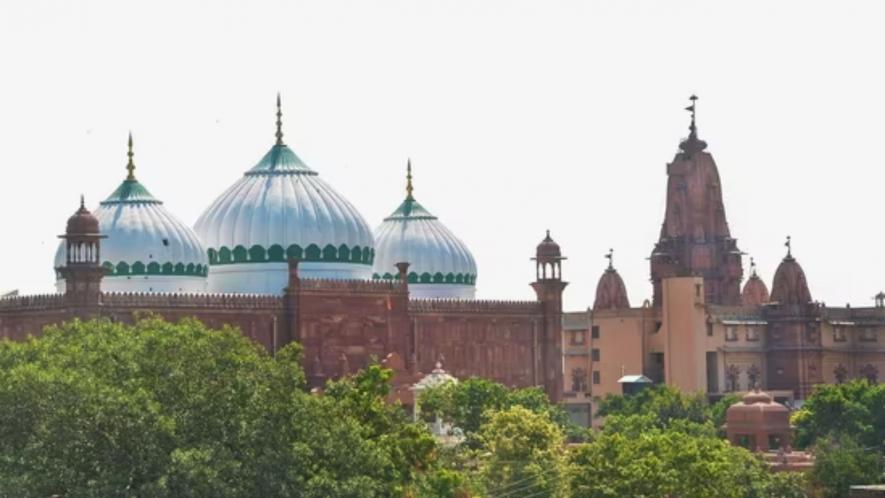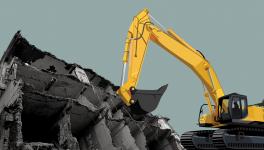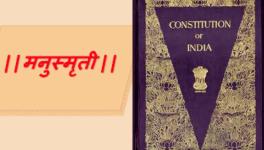Shahi Eidgah Mosque Survey: Top Muslim Body Claims HC's Ruling Contradicts Law

A view of Sri Krishna Janmabhoomi temple and Shahi Idgah mosque, in Mathura. Image Courtesy: PTI
Lucknow: Following the decision by the Allahabad High Court to allow a court-mandated commission to survey Mathura's Shahi Idgah Mosque, situated next to the Sri Krishna Janmabhoomi temple, the Muslim party involved is taking the matter to the Supreme Court.
The case concerns whether Lord Sri Krishna's birthplace is beneath the mosque. A group of Hindu petitioners had sought and got permission from the lower court to conduct a survey, responding to the petitioners' claims that the mosque premises bear indications of being a former Hindu temple.
The petition, filed by deity Bhagwan Sri Krishna Virajman and seven others, asserts that Lord Sri Krishna's birthplace is beneath the mosque, presenting numerous signs indicating the mosque's historical identity as a Hindu temple.
The court agreed to appoint an advocate commissioner to oversee the survey, responding to the petitioners' claims that the mosque premises bear indications of being a former Hindu temple. Justice Mayank Kumar Jain announced that the modalities of the survey would be discussed during the upcoming hearing on December 18.
The survey will be conducted the same way as at the Gyanvapi temple in Varanasi.
Hindu petitioners contend that the mosque was built at Mathura on top of Lord Krishna's birthplace in 1670, following emperor Aurangzeb's orders. It is currently located next to the Krishna Janmasthal Temple, which receives millions of annual visits from Hindu pilgrims.
Meanwhile, Qasim Rasool Ilyas, the All India Muslim Personal Law Board (AIMPLB) spokesperson, expressed optimism about achieving a just resolution for the historic mosque.
He said that the legal committee of the AIMPLB will provide support in this regard. Ilyas emphasised that during the Babri Masjid dispute, the Central government in 1991 passed a law related to places of worship to get rid of all such disputes forever. According to this law, the status of places of worship that existed at the time of the country's independence on August 15 1947, will still remain the same.
"It was expected that no new controversy would arise, but the elements who hate peace and harmony of the country and those who want to fulfil their political interests by creating hatred between Hindus and Muslims will probably not allow this to happen," said Ilyas in a press statement on Friday.
"It [the ruling] also goes against an agreement (formed in compliance with an Act) that divided 13.37 acres of land between the Eidgah and the temple, which was made by local Muslims and Hindus. The controversy was deemed permanently resolved after an agreement was reached between Shahi Eidgah Mosque Trust and Shri Krishna Janmasthan Seva Sansthan, wherein 10.9 acres were given to Krishna Janmabhoomi and 2.5 acres to the mosque," he further added.
Highlighting the mosque's 17th-century history as a place of Muslim worship, he also emphasised the broader application of the Places of Worship Act to protect religious sites across the nation. While the court ruling prohibits excavation at the site, the Supreme Court remains an option for seeking further relief.
What is the Controversy?
This entire dispute between Shri Krishna Janmabhoomi Temple and Shahi Idgah Mosque is regarding the ownership rights on 13.37 acres of land. Shri Krishna Janmabhoomi Temple is built on 11 acres, and Shahi Idgah Mosque is built on the remaining 2.37 acres. The Hindu side claims that the entire land belongs to the Shri Krishna Janmabhoomi temple and is demanding that the entire land be given to them. The Muslim side is denying this claim. Experts claim that the history of this dispute is 350 years old. In 1670, when Delhi was under the rule of Mughal ruler Aurangzeb, the Thakur Keshav Dev Temple was demolished, and the Shahi Idgah Mosque was built on top of it. The remains of the temple were used in the construction of the mosque. This is the reason why the mosque is being claimed to be a symbol of Sanatan Dharma.
In the High Court, the lawyer representing the Shahi Idgah mosque committee and the UP Sunni Central Waqf Board argued that "the prayer made in the application has no nexus with the prayer claimed in the original suit where the relief of cancellation of judgment and decree dated 20.07.1973 and 07.11.1994 is claimed."
Furthermore, they contended that "the Shahi Idgah Mosque does not fall within the ambit of 13.37 acres of land at Katra Keshav Dev."
"Lord Krishna's birthplace is not beneath the mosque."
The lawyers argued that the plaintiffs' claim lacks documentary evidence and is predicated solely on conjecture.
Get the latest reports & analysis with people's perspective on Protests, movements & deep analytical videos, discussions of the current affairs in your Telegram app. Subscribe to NewsClick's Telegram channel & get Real-Time updates on stories, as they get published on our website.
























